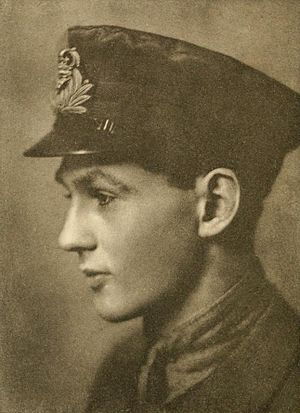Jeffery Day facts for kids
Quick facts for kids
Miles Jeffery Game Day
|
|
|---|---|
 |
|
| Born | 1 December 1896 St. Ives, Huntingdonshire, England |
| Died | 27 February 1918 (aged 21) West of Dunkirk, France |
| Commemorated at | |
| Allegiance | United Kingdom |
| Service/ |
Royal Navy |
| Years of service | 1915–1918 |
| Rank | Flight Commander |
| Unit | HMS Vindex HMS Cassandra No. 13 Squadron RNAS |
| Awards | Distinguished Service Cross |
Flight Commander Miles Jeffery Game Day DSC (born December 1, 1896 – died February 27, 1918) was a brave pilot during World War I. He was known as a "flying ace" because he shot down five enemy aircraft. Jeffery Day was also a talented war poet, writing poems about his experiences.
Contents
About Jeffery Day
Jeffery Day, as he was often called, was born in St. Ives, England. He was one of four children in his family. His father, George Dennis Day, worked as a lawyer. Jeffery went to two schools, Sandroyd and Repton School.
Jeffery joined the Royal Navy in 1915. He started as a "probationary flight sub-lieutenant," which means he was a junior officer learning to fly. He earned his pilot's license in October 1915.
He first served on a ship called Vindex. This ship was a seaplane carrier, meaning it carried planes that could land on water. Jeffery became known as a very skilled and daring pilot. He was promoted to flight lieutenant in December 1916.
Jeffery wanted more action, so he transferred to a light cruiser ship, Cassandra. After this ship had an accident in August 1917, he moved to an experimental air station.
Becoming a Flying Ace
In December 1917, Jeffery joined No. 13 Squadron RNAS, which was based in Dunkirk, France. He flew a type of plane called a Sopwith Camel. Between January and February 1918, he achieved five aerial victories. This means he shot down five enemy planes, earning him the title of "flying ace."
His Final Flight
On February 27, 1918, Jeffery Day was flying about 25 miles west of Dunkirk. He was shot down by a German seaplane. His commanding officer later wrote about what happened. Jeffery attacked six German aircraft by himself. He flew ahead of his own group to break up the enemy formation. This would make it easier for his less experienced fellow pilots to attack.
He hit an enemy plane, but his own plane caught fire. Even though his plane was burning, he stayed calm. He dove down, leveled out, and landed perfectly on the water. He then climbed out of his plane. He waved to his fellow pilots, telling them to go back to their base. His friends were in planes that could not land on water, so they could not help him.
A search was started right away, but Jeffery was never found. Because he has no known grave, his name is remembered on the Chatham Naval Memorial in Kent, England.
Awards for Bravery
Jeffery Day received the Distinguished Service Cross. This award is given for great skill and bravery as a fighting pilot.
For example, on January 25, 1918, he attacked six enemy planes by himself. He managed to shoot one of them down. On February 2, 1918, he found and destroyed an enemy reconnaissance plane flying very high. He destroyed several enemy planes in a short time. He also had many other fights where the outcome was not clear.
His Poetry
Jeffery Day started writing poems in his free time. At first, he wrote funny poems for his friends. Later, he was inspired by other poets and began to write more serious poems.
Only three of his poems were published while he was alive. These were "On the Wings of the Morning," "An Airman's Dream," and part of "To My Brother." "To My Brother" was written after his older brother, Dennis Ivor Day, died in the war. Dennis was a soldier who was shot in September 1915 and died from his injuries in October.
After Jeffery died, all his collected poems were published. Two of his poems were also included in books of war poetry. These books were A Treasury of War Poetry, British and American Poems of the World War, 1914-1919 and Cambridge Poets 1914-1920: an Anthology.
 | George Robert Carruthers |
 | Patricia Bath |
 | Jan Ernst Matzeliger |
 | Alexander Miles |

